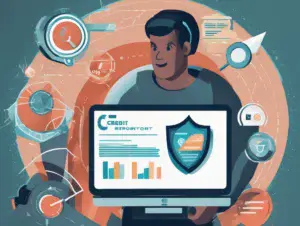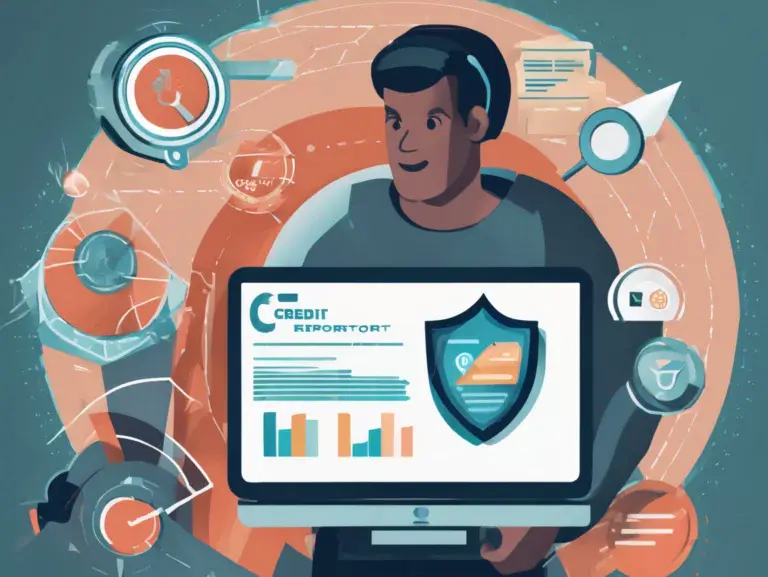in today’s digital age, safeguarding your financial health is more crucial than ever. credit monitoring services play a vital role in helping you stay on top of your financial data. these services track changes in your credit report, alerting you to new inquiries, account openings, and other activities that could impact your credit score.
when you use a monitoring service, you gain real-time insights into your financial profile. automated alerts via email, text, or phone notify you of any unusual activity, helping you detect potential identity theft early. while these services are powerful tools, they aren’t a complete solution for fraud prevention. they work best as part of a broader strategy to protect your personal information.
reputable sources like cnbc and the ftc emphasize the importance of regularly reviewing your credit report. with identity theft affecting millions each year, staying informed is your best defense. by understanding how credit monitoring works, you can make smarter decisions about your financial security.

Understanding Credit Monitoring and Its Importance
Protecting your financial well-being in today’s fast-paced world requires more than just occasional checks. credit monitoring services act as your financial guardians, offering real-time updates and alerts to help you stay ahead of potential threats.
An Overview of Credit Monitoring Services
These services track your credit report for any changes, such as new accounts, hard inquiries, or address updates. They alert you to suspicious activities, which can be crucial in detecting identity theft early. While they don’t prevent fraud entirely, they are a powerful tool in your financial security arsenal.
Why Monitoring Your Credit Matters for Your Financial Health
Regular monitoring ensures you have up-to-date information, which is vital for maintaining a healthy credit score. Services often provide alerts via email or text, notifying you of significant changes. This proactive approach helps you address issues before they escalate, whether it’s correcting errors or stopping fraudulent activities.

Both free and paid services are available. Free options, like those from banks or credit card companies, offer basic tracking. Paid services provide more comprehensive features, such as dark web monitoring and identity theft insurance. Understanding these options helps you choose the best fit for your needs.
What Is Credit Monitoring? Understanding The Basics
Maintaining control over your financial security is essential in today’s connected world. credit monitoring services act as your financial guardians, offering real-time updates and alerts to help you stay ahead of potential threats.
How Credit Monitoring Works in Real Time
These services track your credit report for any changes, such as new accounts, hard inquiries, or address updates. They alert you to suspicious activities, which can be crucial in detecting identity theft early. While they don’t prevent fraud entirely, they are a powerful tool in your financial security arsenal.
Key Features and Limitations of Monitoring Services
Regular monitoring ensures you have up-to-date information, which is vital for maintaining a healthy credit score. Services often provide alerts via email or text, notifying you of significant changes. This proactive approach helps you address issues before they escalate, whether it’s correcting errors or stopping fraudulent activities.
| Feature | Free Services | Premium Services |
|---|---|---|
| Real-time Alerts | Limited to new inquiries and accounts | Includes balance changes, credit utilization, and more |
| Credit Bureau Monitoring | Single bureau (e.g., Experian) | Tri-bureau monitoring |
| Additional Features | Basic monitoring | Dark web scans, identity theft insurance |
Both free and paid services are available. Free options, like those from banks or credit card companies, offer basic tracking. Paid services provide more comprehensive features, such as dark web monitoring and identity theft insurance. Understanding these options helps you choose the best fit for your needs.

Types of Credit Monitoring Services
Choosing the right credit monitoring service depends on your financial needs and risk level. While free services offer basic protection, paid options provide enhanced features. Understanding the differences helps you make an informed decision.
Free Versus Paid Credit Monitoring Options
Free services typically monitor one credit bureau and offer basic alerts for new accounts or inquiries. Paid services, however, monitor all three bureaus, offering detailed alerts on balance changes and dormant accounts. They also include perks like dark web scans and identity theft insurance.
Tri-Bureau vs. Single Bureau Monitoring Explained
Tri-bureau monitoring tracks changes across all three credit bureaus, providing a comprehensive view. Single bureau monitoring may miss issues since lenders report to different bureaus. For example, a new account opened with information from Equifax won’t show up on Experian’s report.
Consider cost, coverage, and alerts. Free services are great for basic needs, while paid services offer better fraud detection. Choose based on your financial situation and risk tolerance.
How Credit Monitoring Helps Prevent Identity Theft
Guarding your financial security is more important than ever. credit monitoring services act as a watchful eye, helping you spot potential threats before they escalate. These services track your credit report for changes, such as new accounts or inquiries, which could signal identity theft.
Detecting Unusual Activity on Your Credit Report
Unusual activity, like an unexpected new account or a sudden change in credit utilization, can be caught early with credit monitoring. This allows you to act quickly, reducing potential damage. For example, if someone opens a credit card in your name, real-time alerts can notify you so you can address the issue promptly.
Alert Systems and What They Don’t Do
Alert systems send notifications via email, text, or phone when they detect changes. However, they don’t stop fraud; they merely inform you. It’s crucial to understand that while these alerts are helpful, they require you to take action to prevent further harm.
Understanding Fraud and Identity Theft Protection
While credit monitoring is a powerful tool, it’s not a standalone solution. Pairing it with additional measures like identity theft protection and dark web monitoring enhances your security. If you discover suspicious activity, contact the credit bureaus and file a fraud report immediately.
| Feature | Free Services | Premium Services |
|---|---|---|
| Alerts | Basic alerts for new accounts | Advanced alerts for balance changes |
| Credit Bureau Monitoring | Single bureau | Tri-bureau |
| Additional Features | Basic monitoring | Dark web scans, insurance |
Additional Strategies to Safeguard Your Financial Health
While credit monitoring services are essential, they are just one part of a comprehensive financial security plan. To further protect your finances, consider implementing these additional strategies.
Utilizing Free Credit Reports and Regular Checks
You can access free credit reports weekly from AnnualCreditReport.com. This service allows you to monitor your credit report from all three bureaus, helping you spot errors or signs of identity theft early.
Other Protective Measures Beyond Monitoring
Freezing your credit report adds an extra layer of security, preventing unauthorized access. Regularly monitoring your bank accounts and securing your online information with strong passwords can also prevent fraud. Be cautious of phishing scams to protect your personal data.
| Feature | Free Services | Premium Services |
|---|---|---|
| Alerts | Basic alerts for new accounts | Advanced alerts for balance changes |
| Credit Bureau Monitoring | Single bureau | Tri-bureau |
| Additional Features | Basic monitoring | Dark web scans, identity theft insurance |
Combining these strategies with credit monitoring offers robust protection. Stay proactive to ensure your financial security and peace of mind.
Selecting the Right Credit Monitoring Service for You
Choosing the right credit monitoring service can feel overwhelming with so many options available. However, by focusing on key criteria, you can make an informed decision that fits your financial needs.
Evaluating Costs, Features, and Customer Reviews
Start by comparing the costs of different services. Free options like Credit Karma offer basic credit monitoring without requiring a credit card. Paid services, such as Experian IdentityWorks, provide advanced features like identity theft insurance and dark web monitoring. Consider what features are essential to you and whether they justify the cost.
Read customer reviews to gauge service reliability and user satisfaction. For example, Identity Guard is praised for its comprehensive alerts, while Credit Sesame offers a user-friendly dashboard. These insights can help you choose a service that aligns with your expectations.
Tips for Integrating Monitoring with Broader Financial Strategies
To maximize the benefits of credit monitoring, integrate it into your overall financial plan. Regularly review your credit report to catch errors or signs of identity theft early. Combine this with strategies like freezing your credit report for added security and monitoring your bank accounts to prevent fraud.
Consider services that offer identity theft protection and dark web scans for enhanced security. Additionally, take advantage of free credit reports from AnnualCreditReport.com to stay informed about your financial status.
By thoughtfully evaluating costs, features, and reviews, and integrating credit monitoring into your broader financial strategy, you can make a decision that effectively protects your financial health.
Conclusion
As you navigate the complexities of modern finance, credit monitoring stands out as a vital tool for managing your financial health. By keeping a watchful eye on your credit report, these services help you detect potential identity theftearly and track changes that could impact your credit score.
While credit monitoring services provide timely alerts, they are most effective when part of a larger defensive strategy. Stay proactive by regularly reviewing your credit report and considering additional measures like freezing your credit card information for extra security.
When selecting a monitoring service, weigh factors like cost and features. Free services offer basic alerts, while paid options provide advanced features such as identity theft insurance. Remember, understanding your options empowers you to secure your financial future.
Take control today and make informed decisions to protect your credit. Your financial security is in your hands.
FAQ
How does credit monitoring help protect against identity theft?
Credit monitoring alerts you to unusual activity, such as new accounts or inquiries, helping you catch potential fraud early. This proactive approach can prevent identity theft from causing significant damage to your financial health.
What are the benefits of using a credit monitoring service?
Benefits include real-time alerts, access to your credit score, and regular updates to your credit report. These tools help you stay on top of your financial health and detect potential issues before they escalate.
Can I monitor my credit for free, or do I need to pay for a service?
You can access free credit reports annually from each of the three major bureaus (Equifax, Experian, and TransUnion). However, paid services often provide additional features like daily monitoring, fraud alerts, and identity theft protection.
How often should I check my credit report?
It’s a good idea to check your credit report at least once a month to ensure accuracy and detect any suspicious activity. Regular checks can help you address errors or fraud promptly.
What’s the difference between tri-bureau and single-bureau monitoring?
Tri-bureau monitoring tracks changes across all three credit bureaus (Equifax, Experian, and TransUnion), while single-bureau monitoring only follows one. Tri-bureau offers a more comprehensive view of your credit activity.
Will using a credit monitoring service affect my credit score?
No, monitoring your credit does not impact your credit score. It’s a soft inquiry, so it won’t affect your ability to apply for loans or credit cards.
How do fraud alerts differ from credit monitoring?
Fraud alerts are warnings triggered by specific suspicious activities, while credit monitoring provides ongoing oversight of your credit report and score. Together, they offer robust protection against identity theft and fraud.
Can I use credit monitoring to detect activity on the dark web?
Some advanced services include dark web monitoring to scan for your personal information, such as your Social Security number or bank account details, being sold illegally online.
How do I choose the best credit monitoring service for my needs?
Consider factors like cost, features (e.g., tri-bureau monitoring, fraud alerts), and customer reviews. Ensure the service aligns with your budget and provides the level of protection you need.









